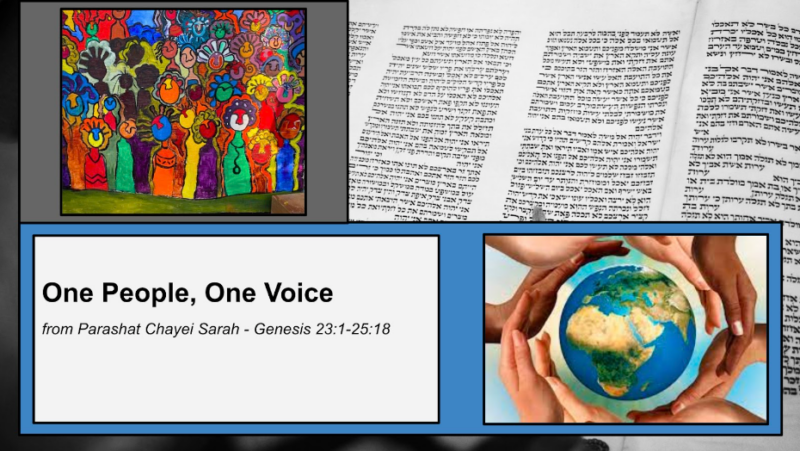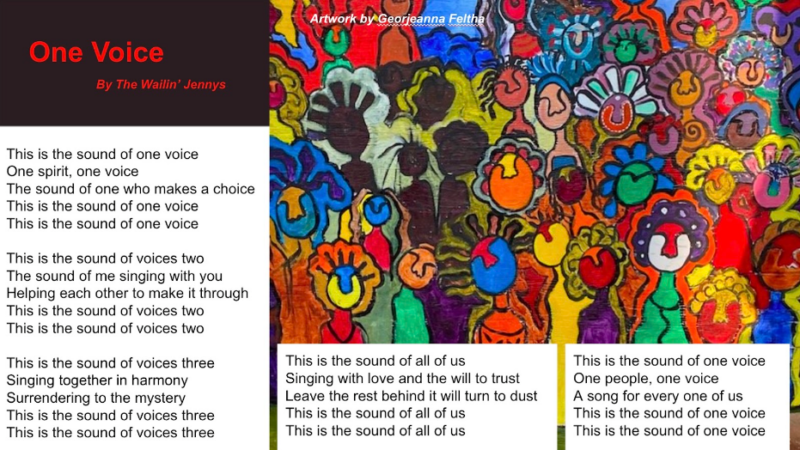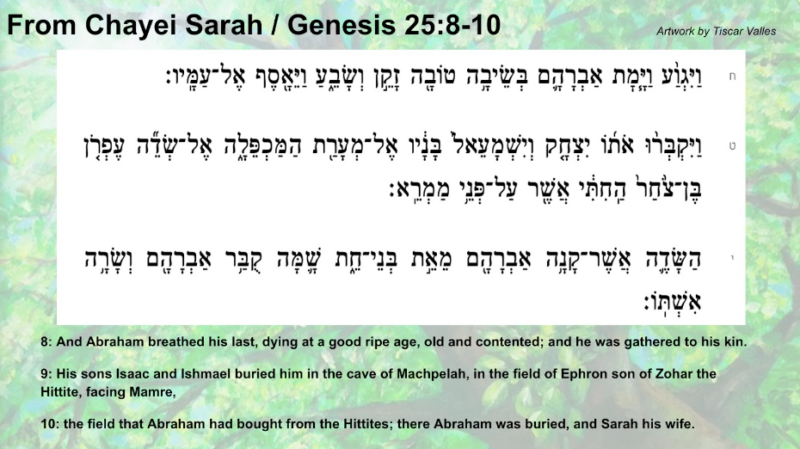Guest Post: “One People, One Voice”
This guest post is from cantorial soloist and CBI member Ziva Larson, who led Shabbat services on Saturday, November 11, 2023.
The Torah portion we read this week is entitled “Chayei Sarah,” which means “The Life of Sarah.” Interestingly, the parashah does not include a narrative of Sarah’s life. Instead, it begins with an announcement of Sarah’s death and the story of her burial. And this is not the only death that is mentioned in this parashah. The deaths of Abraham and of Abraham and Hagar’s son, Ishamel, are also included in this parashah.
This raises the question: Why is this parashah called “The Life of Sarah” when the narrative includes more details about the deaths of multiple individuals than it does about Sarah’s life? If we look at other elements of this parashah, a possible explanation begins to emerge.
After Sarah’s death, Abraham needs to find land for a burial site for her. At the time, he is living among the Hittites. When the Hittites learn of Abraham’s need, they generously offer to give him some of their land for a burial site. Abraham offers to pay for the land, but the Hittites initially turn him down. Eventually, however, Abraham convinces the Hittites to name a price for the land, which he pays.
This exchange depicts the respect and care shown to Abraham (and Sarah) by the Hittites even though they are not members of the Hittites’ community. It also depicts Abraham’s respect for the Hittites by his insistence on paying the Hittites fairly for the land he was receiving for a burial site. The lesson from Torah here is that respect and care for other people, even those who are not part of your family or community, is paramount.
While death is an important life event, it is obviously not the only life event. Another event recorded in this parashah is the search for a wife for Isaac and his initial encounter with and marriage to Rebekah, a woman who originates from outside of the community in which Isaac is currently living. And while some connections between different communities already exist due to the fact that Rebekah comes from Abraham’s homeland, her marriage to Isaac establishes additional connections between the people among whom Abraham currently resides (the Caananites and Hittites) and the people Abraham resided among while he was growing up. It also, by virtue of Isaac being Sarah’s child, establishes connections between Sarah’s life and even more people.
Relatedly, this parashah includes multiple lists of Sarah’s family members and their descendants, including Ishmael and including Abraham’s second wife, Keturah, and her sons. It also mentions Abraham’s concubines and their sons. And even though these members of Abraham’s family are not traditionally considered part of the Biblical Israelite community, the fact that they are still mentioned in Torah reinforces the fact that they are human beings and are worthy of respect and of not being made invisible or devalued.
The inclusion of all of these life events and details about family members and family trees in a parashah that is entitled “The Life of Sarah” got me thinking – the thing that all of these things have in common is relationships. Birth and death are the bookends of life. And in between are the relationships we have with other people in the world – not just those from our own families or communities, but all people who inhabit the Earth.
These relationships – this connection – between all people is further emphasized by a phrase that appears twice in this parashah – once when Abraham, the patriarch of the Israelites, dies and once when Ishmael, the patriarch of the Ishmaelites, dies: “Vayei-asef el amav.” (וַיֵּאָסֶף אֶל־עַמָּיו) This phrase is commonly translated as: “And he was gathered to his kin.” However, the Hebrew word “am” (עַם) literally means “people.” So another possible translation is: “And he was gathered to his people.”
When we die, we all become part of the same earth. Maybe being “gathered to [your] kin” (or to your people) is indicative of a final returning to an ultimate connection with the other human beings in the world. We have all returned to dust. We are all one, together, part of this world.
In other words, even though we may belong to separate families and communities, we are all kin, all family, all one people – we are all human beings. And all of us, regardless of family or community, are important and valuable.
I think the reason this parashah is called “The Life of Sarah” – despite the fact that it details the deaths of Sarah, Abraham, and Ishmael rather than recounting Sarah’s life story – is because, at its core, this parashah is teaching us that we are all connected in both life and death and that our lives are not just about our own experiences but also about our relationships with and connection to others, both in our families and communities and as people who dwell together on Earth.
When we are alive, we can unify our voices to support one another in life. When we die, we unite as earth, as the foundation of continued life for others. And if we make the choice to join our voices, to connect with one another, and to respect, care for, and support one another, we can work together to end oppression, violence, and suffering. And together, we can bring more love, peace, and hope into the world.
May our voices rise together, and may we all, together, bring more love, peace, and hope into the world.
Shabbat shalom.
References
- Sefaria:
- Torah:
- Genesis 23:1-25:18 (Chayei Sarah): https://www.sefaria.org/Genesis.23.1?lang=bi&aliyot=0
- Genesis 25:8-10 (excerpt from Chayei Sarah): https://www.sefaria.org/Genesis.25.8-10?lang=bi&aliyot=0
- Torah:
- “One Voice” by The Wailin’ Jennys: https://www.youtube.com/watch?v=-jKH6kILbho
- Artwork on “One Voice” lyrics slide by Georjeanna Feltha
- Artwork on Torah slide (Genesis 25:8-10) by Tiscar Valles








